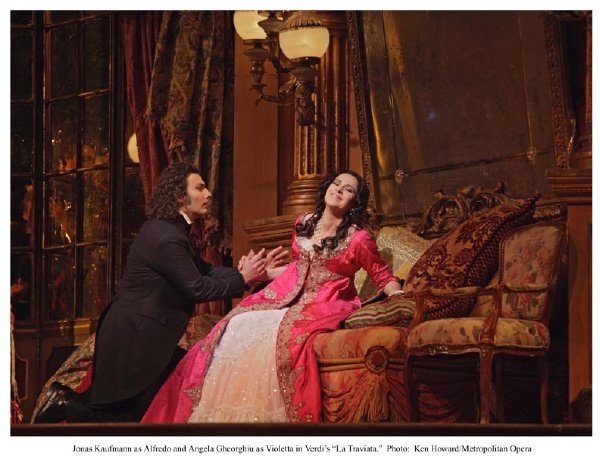|
|
|
|
|
|
|
|
| NYmag, Feb 26, 2006 |
| By Peter G. Davis |
Verdi: La Traviata, Metropolitan Opera House, February 2006
|
Brangelina Sings!
|
| Well, not quite. But Angela
Gheorghiu and Jonas Kaufmann do as much for the eyes as for the ears. |
|
 That eternal symbol of grand opera in all its
silliness—an overweight, middle-aged singer in a horned helmet bellowing out
high Cs to an equally unattractive partner—will probably never die, but the
Metropolitan Opera has been doing its best lately to dispel the myth. Two of
Verdi’s most popular operas, Rigoletto and La Traviata, recently returned to
the repertory, each featuring a love couple that could easily compete with
Tom and Katie or Brad and Angelina. It’s too late to catch Anna Netrebko and
Rolando Villazón in Rigoletto, but there’s still time to take in Angela
Gheorghiu and Jonas Kaufmann as the fated lovers in La Traviata. They both
look fabulous, and connoisseurs of singing might approve as well. That eternal symbol of grand opera in all its
silliness—an overweight, middle-aged singer in a horned helmet bellowing out
high Cs to an equally unattractive partner—will probably never die, but the
Metropolitan Opera has been doing its best lately to dispel the myth. Two of
Verdi’s most popular operas, Rigoletto and La Traviata, recently returned to
the repertory, each featuring a love couple that could easily compete with
Tom and Katie or Brad and Angelina. It’s too late to catch Anna Netrebko and
Rolando Villazón in Rigoletto, but there’s still time to take in Angela
Gheorghiu and Jonas Kaufmann as the fated lovers in La Traviata. They both
look fabulous, and connoisseurs of singing might approve as well.
Gheorghiu first won international fame as Violetta back in 1992, when she
sang, recorded, and filmed the part at Covent Garden. It’s taken all this
time for her interpretation to reach the Met—a tale too involved to retell
here, but suffice to say that it has to do with the sort of spiteful
diva-management disagreements that all too often deprive the fans of their
red meat. The Met’s current 1998 Traviata production, in fact, was
originally intended to star Gheorghiu and her husband, Roberto Alagna, until
the tenor’s suggestion that his brother redesign part of the production was
declined and a new cast had to be found. All that is forgiven and forgotten,
and Gheorghiu has finally come to claim her role—although without Alagna,
with whom she now sings less frequently. But that is another story.
Perhaps the wait was worth it. The glitzy Franco Zeffirelli production is
now merely tasteless rather than downright vulgar—the famous dancing cows at
Flora’s party have long since been put out to pasture, along with much other
decorative nonsense. Several Violettas have competed with the scenery over
the past few seasons, but Gheorghiu is the first I’ve seen who can actually
upstage her surroundings and get somewhere near the heart of this classic
courtesan. She looks stunning, in the mold of Garbo and Callas: a
dark-haired, impeccably gowned lady of the camellias with a sad cameo face,
dangerous fragility, and an air that commands attention without hogging the
scene. It’s a vocally complete portrait as well, with the feverish
coloratura of the first act all precisely in place, the heartbreak of the
duet with Germont limned with lyrical understatement, and the pathos of the
death scene reaching up to touch tragedy. Her carefully made vocal points
would probably be even more affecting in a smaller house, but an important
singer has at last had a Met triumph.
Jonas Kaufmann not only has the look and easy stage bearing of a rock
star, but he also has a flexibility seldom heard in German tenors—he sings
Parsifal and Florestan with distinction, as well as lyrical roles like
Alfredo. If his voice lacks the ringing lift up top that one ideally likes
in a Verdi tenor, the overall tone is smoothly burnished, beautifully
focused on the notes, and always disarmingly musical. Anthony
Michaels-Moore’s rather gruffly sung Germont, complete with an interpolated
high B-flat at the end of his aria, is adequate, and conductor Marco
Armiliato gives everyone onstage helpful and idiomatic support. All that is
very nice, but what makes this Traviata special is the grade-A glamour
generated by its two attractive stars.
|
|
|
|
|
|
|
|
|
|
|
|
|
|
|
|
|
|
|